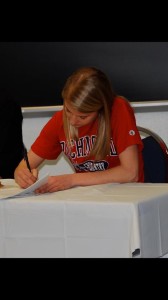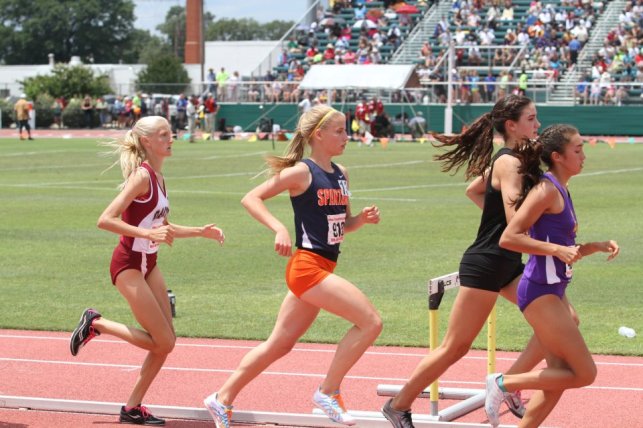While she was worried about increased weekly mileage, fitting into a new team, and balancing running with schoolwork her first time away from home, Maddie Wittich‘s decision to run in college was ultimately easy.
“I can tell from the way I feel during my runs that I have so much left in me and I feel like I need to keep going,” said Wittich, who is entering her freshman year at the University of Richmond. “I still want to improve so much and get new PRs and I know that college will offer that to me.”
Wittich knew during her freshman year at West Springfield High School in Virginia that running in college was an option, having watched two of her senior teammates go on to run at Virginia Tech. She didn’t seriously consider it, though, until her junior year, when she began receiving letters from college coaches and her dad, a marathoner, encouraged her to look at her opportunities. She toured Lafayette College, Virginia Tech and Richmond without contacting the coaches first.
“If I liked the school itself, I’d contact the coach to see if the program was interested in me,” she said. “That’s what I did … because I wanted to make sure I liked the school first.”
She ended up visiting Richmond several times before contacting the coaches. The first was just a campus drive-through with her dad. When she liked the campus, her mother took her back for an official guided tour and visit. She fit firmly into one of Herndon High School coach Peter Sherry’s typical prospective collegiate runner categories: She knew where she wanted to go and thought about competing later.
Other categories include students choosing a program based on the amount of scholarship money available and students who choose their college based on whether they can run on the team.
Wittich contacted the coaches during her junior year and the following summer made her official visit. The next fall, she had a partial scholarship offer and plans made for the next few years. The Springfield native is one of three new freshman girls to join the team this year, including Osborn High School’s Emma Nowak.
Her approach to picking a college didn’t surprise her coach, Chris Pellegrini.
“She’s always been very mature,” he said. “Her teammates call her either ‘mom’ or ‘grandma’ because she’s the one they look to for leadership.”
With fewer than 20 women on the Richmond Spiders, the coaches’ personalized attention made her feel like she wouldn’t get lost in the crowd.
“At a lot of big schools, I think there are so many athletes that the coaches have to focus on that they don’t get personal focus,” she said. “Richmond doesn’t have that many athletes, so [the coaches] fit the program to you and make it very personalized. The coaches care a lot about each individual athlete.”

Wittich is already working on a personalized training plan designed by Richmond coaches Lori and Steve Taylor and assistant coach Jon Molz. It includes speed workouts, strides, and longer runs once a week combined with other basic runs to hit about 40 miles a week. Her total weekly mileage will increase to about 60 by the end of the summer.
She comes from a lower-mileage high school program that emphasized quality. While college would mean more miles no matter where she went, she was looking for a college program with a similar philosophy.
“It’ll be higher mileage, but I’m pretty sure I’m ready for that. If something starts to hurt, I’ll contact my coaches,” said the athlete, who remained injury free through four years of competitive high school running.
Other things that influenced her decision to continue running in college included the opportunity to run with and against skilled athletes, the chance to travel with the team, and the outlet of a team to make new friends. There were some negatives she had to weigh in her decision. She won’t be able to go out every weekend like a lot of college freshman, and will need to focus on eating well, taking care of herself, and getting a good night’s rest. However, she said she’s already gotten used to living this kind of lifestyle after running four years competitively in high school.
Newfound freedom, and its pitfalls, are a major obstacle for freshman student athletes. Debbie Wilson, associate athletic director for academic affairs at George Mason University, said time management skills are the crucial link between success and struggling with college academics and athletics.
“College athletes are typically sleep deprived,” she said. “They need the same seven or eight hours as a normal college-aged person, but they need additional resting time to recover from what they’re doing to their bodies.”
Wittich is a little worried about balancing school work with training her first time away at school. The Richmond team practices from 7:30 to 10 a.m. every day, with additional time spent cross training solo each afternoon.
“It’s a different team, a new set of coaches to get used to, and adjusting to college at the same time,” she said. Luckily, Wilson said, most colleges, and especially Division I schools, have full-time academic support staff on hand to assist students with their college transition. That said, collegiate athletes tend to graduate on time more than non-athletes
and with higher grades.
While Wittich may be running more miles and more hours, she won’t be competing as often. While high school
runners have races every week, college athletes only compete every other week, she said. Now that she’s formally committed to Richmond and is preparing to get started training with the team in August, she’s happy with her decision.
“I’m very confident with my decision,” she said. “I believe I’ll have an absolutely awesome time, I’ve heard nothing but positive things about the Taylors’ program.”
She can only hope her college experience mirrors her running career thus far.
“I joined cross country my freshman year to make friends before going into high school, because I’d heard how scary
it is and knew it would be good to join a sports team,” she said. “I knew there would be great people and that’s exactly
what I got. I love team and will miss them. It was a great atmosphere, the coaches were fantastic. It opened up a lot of great opportunities for me.”
Wittich is a member of the Class of 2017, but she expects to be a runner for life.
“I am unbelievably happy I decided to start my freshman year because I’ve really come to love the sport,” she said. “I will definitely continue to do it. I’d love to do a marathon at some point when I’m done with college, that’s one of my big goals.”
| For athletes interested in competing collegiately, Herndon High School Coach Peter Sherry, who has 11 former athletes running collegiately now, has a few pieces of advice:• Pick the school regardless of who is coaching, or even regardless of whether you are running. “Going to school somewhere is different if you’re running than if you’re injured. Like the actual school you choose.”•When looking at a college, don’t spend too much time getting to know the juniors and seniors on the team. “They’ll be gone by the time you get there. Hang out with the freshmen and sophomores, they’ll be your teammates for a few years.”• If you want to run in college, you can make it happen. “It might be a matter of going somewhere out of state or a smaller school, but there are opportunities for everyone to run for a college team.” |


